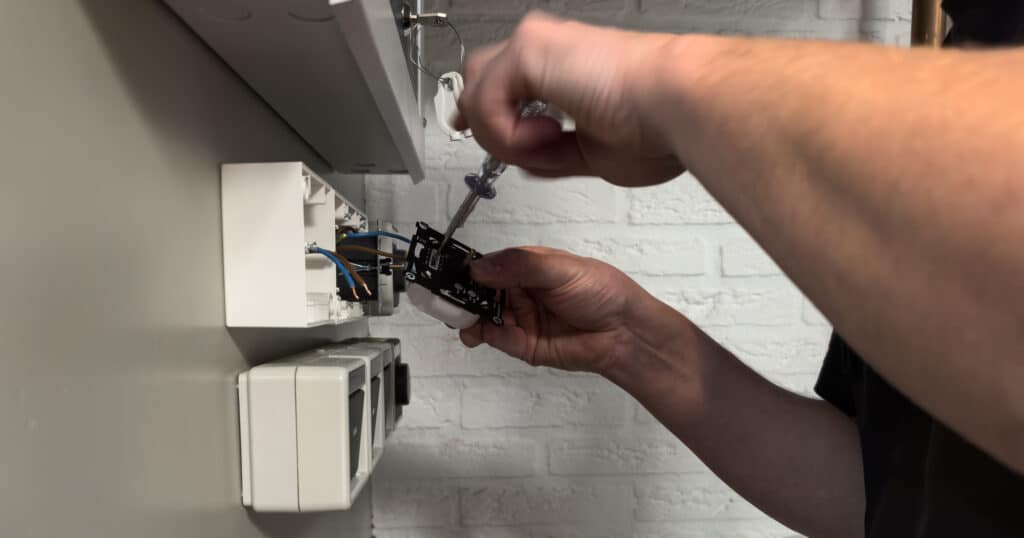ADU Electric Services
What is an ADU?
An ADU, or Accessory Dwelling Unit, is a small house or living space on the same property as a larger main home. Think of it like a tiny second home or a cozy apartment that shares the lot with the main house. People build ADUs for different reasons, like having a place for family to stay, renting it out for extra money, or having more living space. They can be attached to the main house, like a basement or garage turned into an apartment, or completely separate, like a little cottage in the backyard.

Why Consider ADU?
Accessory Dwelling Units, or ADUs, are tiny homes that can be built on the same land as a larger main house. They’re also known as granny flats, in-law units, or backyard cottages. Here’s why homeowners might want to think about the cost of adding an ADU to your property:
- Extra Income: Renting out an ADU can bring in extra money each month.
- More Space: They provide additional living space for family members or guests.
- Increase Property Value: Adding an ADU can boost the overall value of your property.
- Flexibility: ADUs can be used for many purposes, like a home office or art studio.
- Community Benefits: They can help ease housing shortages by adding more living options in the community.
Hiring an Electrical Contractor for Your ADU Build
When building an ADU, it’s a good idea for homeowners to hire a licensed electrician. They know the codes and can make sure everything is done right. Plus, they can spot problems that you might not see.
Remember, these are just the basics. Your local building department can give you more details. Following these rules will help make your ADU a safe place to live.

ADU Electrical Requirements in California
When planning to build an Accessory Dwelling Unit (ADU) in California, knowing the electrical requirements is essential. These rules ensure your ADU construction is safe and has enough power for all its needs.
Building Codes
First, your ADU contractor must follow the California Electrical Code (CEC). This code is part of the larger California Building Standards Code. It sets the minimum standards for everything electrical in buildings, like wiring materials and equipment.
Permits
Before you start any work, you need to get permits from your general contractor, and your local building department. They’ll check your plans to make sure they meet the CEC and other local rules.
Service Panels
Your ADU might need a separate service panel, which is like the heart of your electrical system. If your main house’s own electrical panel can handle the extra load, you might be able to connect the ADU to it. But if not, you’ll need a new one just for the ADU.
Circuit Breakers
Each circuit in your ADU will need a breaker. Breakers protect your wires and circuits from getting too hot and starting a fire. They also help keep you safe from electric shocks.
Outlets and Fixtures
The CEC says estimate how many outlets and light fixtures you need. For example, you must have outlets every so many feet in a room. This ensures you have adequate outlets for everyday living, and don’t have to use too many extension cords.
Energy Efficiency
California cares a lot about the costs and saving energy. So, there are rules about using energy-efficient lighting and appliances in your ADU.
Smoke Alarms and Carbon Monoxide Detectors
You must install smoke alarms and carbon monoxide detectors in residential building in your ADU. They must be in certain places, like near bedrooms, to keep everyone safe.
How we can help Wire Your Accessory Dwelling Unit
Andrade Link Electric can be a big help when you’re setting up the electrical system for construction of an Accessory Dwelling Unit (ADU). Here’s how we can assist:
Planning and Design: We’ll work with you to create an electrical plan that meets your ADU’s needs, making sure it’s safe and efficient.
Permits and Codes: We know all about the local building codes and can get the right permits to make sure your electrical work is up to code and safe.
Wiring and Installation: From running new wires to installing outlets and fixtures, we’ll handle all the details of getting your ADU powered up.
Upgrades and Improvements: If your ADU needs more power or better lighting, we can upgrade your system to handle the latest appliances and tech.
Safety Checks: Safety is the most important part. We’ll check everything to make sure there are no risks of electrical fires or shocks.
Energy Efficiency: We can suggest ways to make your ADU use less electricity, which is good for the planet and your wallet.
Troubleshooting and Repairs: If something’s not working right, they’ll figure out the problem and fix it fast.
By choosing Andrade Link Electric, you’re making sure the quality of your ADU’s electrical system is in good hands from start to finish.
FAQs
Yes, an ADU, which stands for Accessory Dwelling Unit, can have its own separate electrical panel. This is actually pretty common because it allows the ADU to have its own power control, making it easier to track electricity use. It’s like having a mini-house with its own set of switches and breakers. However, getting a separate electrical panel installed involves following local building codes and usually requires a professional electrician to do the work. It’s important to get the right permits and inspections to make sure everything is safe and up to code.
When you build an Accessory Dwelling Unit (ADU), whether you need a separate electrical meter depends on your location, local regulations and your personal preferences. Some cities require ADUs to have their own meters, while others do not.
If you do need a separate meter, the cost can vary widely. It could be anywhere from a few hundred dollars to several thousand. The price includes the meter itself, installation, and any necessary inspections or permits. Sometimes, there might be additional costs for upgrading the electrical panel or running new wiring separate electric meter.
If you don’t need a separate meter, you can share the main house’s meter and residential unit. This option is usually cheaper since it avoids the extra equipment and labor costs. However, it could make tracking electricity usage more difficult if you plan to rent out the ADU.
To get the most accurate information:
1. Check with your local building department about code compliance and the requirements.
2. Contact a licensed electrician for a quote based on your specific situation.
Remember, prices for materials can change over time, so it’s best to get current estimates when planning your project.
You might need to upgrade your electric service for an Accessory Dwelling Unit (ADU) if the current service doesn’t have enough capacity to handle the extra load. Here’s how you can figure out if an upgrade is necessary:
Check Current Capacity: Look at your main electrical panel to see the amperage – that’s how much electricity it can handle. Common sizes are 100, 150, or 200 amps.
Calculate Additional Load: Estimate how much more power the ADU will use. This includes lights, appliances, heating and cooling systems, and any other electronics.
Consult a Professional: An electrician can help you understand if your current system can support the ADU or if you need an upgrade.
Consider Future Use: Think about whether you’ll add more devices or another structure in the future. It might be smart to upgrade now to avoid doing it again later.
Check Local Codes: Your city or county might have specific requirements for electrical service to an ADU.
Budget for Costs: Upgrading can be expensive, so make sure to include this in your budget for the ADU project.
When you’re thinking about utilities for your Accessory Dwelling Unit (ADU), it’s usually best to start by considering using the main property’s utilities. This can often be less expensive and easier to manage than setting up new services. Here are some points to think about:
Cost: Connecting to the existing utilities might save you money because you won’t have to pay for new meters or connection fees.
Construction: It can be simpler to extend current services than to install new ones, which might require digging up the street or yard.
Regulations: Check with your local government. Some places might require you to use the main property’s utilities for an ADU.
Capacity: Make sure the main house’s systems can handle the extra load from the ADU. You might need to upgrade things like your water heater or electrical panel.
Billing: If you use the main utilities, you’ll get one bill for both the main house and the ADU. This could be more convenient, but if you plan to rent out the ADU, you’ll need to figure out how to split the costs.
When you’re adding an Accessory Dwelling Unit (ADU) to your property, there are a lot of things to think about. One important step is to consider upgrading your main electrical panel. Here’s why:
More Power Needed: Your current electrical panel might not have enough power for both your main house and the new ADU. Upgrading the panel means you can make sure there’s enough electricity to go around.
Safety First: Older panels might not meet today’s safety standards. An upgrade can help protect your home from electrical fires or other hazards.
New Appliances: If your ADU has modern appliances or gadgets, they may need more electricity than older models. A new panel can handle these without a problem.
Avoiding Outages: With more people living on your property, there’s a higher chance of tripping the breaker. An upgraded panel reduces the risk of losing power.
Future-Proofing: Even if you don’t need the extra power right now, it’s smart to plan for the future. You might add more devices or even electric vehicles that will need more electricity.
Legal Requirements: Local laws might actually require you to upgrade your panel when building an ADU. This ensures everything is up to code and safe.
Value Increase: Improving your electrical system can also increase the value of your property. It’s a good investment if you ever decide to sell.
An ADU, or Accessory Dwelling Unit, typically requires a certain number of amps for electricity depending on its size and the appliances you plan to use. On average, a small ADU might need around 60 to 100 amps, while a larger one or one with high-power appliances might require 100 to 200 amps. It’s important to have an electrician check your specific needs based on what you’ll have in your ADU.
